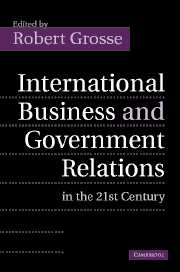Book contents
- Frontmatter
- Contents
- List of figures
- List of tables
- List of contributors
- Acknowledgments
- Introduction
- Part I History and theories of analysis of international business–government relations
- 1 Early US business-school literature (1960–1975) on international business–government relations: its twenty-first-century relevance
- 2 Institutional reform, foreign direct investment, and European transition economies
- 3 Corporate governance in the global economy: international convergence or continuing diversity?
- 4 Revisiting rival states: beyond the triangle?
- Part II The shifting international business–government partnership
- Part III Bargaining theory and the obsolescing bargain
- Part IV Host and home government views of international business
- Conclusions
- References
- Select bibliography of J. N. Behrman's works
- Index
2 - Institutional reform, foreign direct investment, and European transition economies
Published online by Cambridge University Press: 22 September 2009
- Frontmatter
- Contents
- List of figures
- List of tables
- List of contributors
- Acknowledgments
- Introduction
- Part I History and theories of analysis of international business–government relations
- 1 Early US business-school literature (1960–1975) on international business–government relations: its twenty-first-century relevance
- 2 Institutional reform, foreign direct investment, and European transition economies
- 3 Corporate governance in the global economy: international convergence or continuing diversity?
- 4 Revisiting rival states: beyond the triangle?
- Part II The shifting international business–government partnership
- Part III Bargaining theory and the obsolescing bargain
- Part IV Host and home government views of international business
- Conclusions
- References
- Select bibliography of J. N. Behrman's works
- Index
Summary
Introduction
This chapter addresses the role of institutions and institutional reform as a country-specific competitive advantage affecting the location of inbound foreign direct investment (FDI). Our focus of interest will be on European transition economies. Our thesis (backed up by a limited amount of econometric and field research) is that the extent and quality of a nation's institutions and its institutional infrastructure (II) are becoming a more important component of both (a) its overall productivity, and (b) its drawing power to attract inbound FDI. This, in turn, reflects the belief by private corporations (both foreign and home based) that the role played by location bound institutions and organizations in twenty-first-century society is becoming an increasingly critical determinant of the successful deployment of their own ownership specific, but often mobile, assets.
The chapter proceeds in the following way. First, we shall offer a simple analytical framework which might help us to explore the thesis set out above. Second, we shall identify the more significant firm-specific strategies and those affecting host transition economies, brought about by changes in the world economic and political scenario over the past decade or so; and how these are affecting the locational pull and push of multinational enterprise (MNE) activity. In particular, we shall examine the evidence of the links between the upgrading of the II of the Central and Eastern European region and its propensity to attract inbound FDI (vis-à-vis other areas in the world).
- Type
- Chapter
- Information
- Publisher: Cambridge University PressPrint publication year: 2005
- 6
- Cited by



